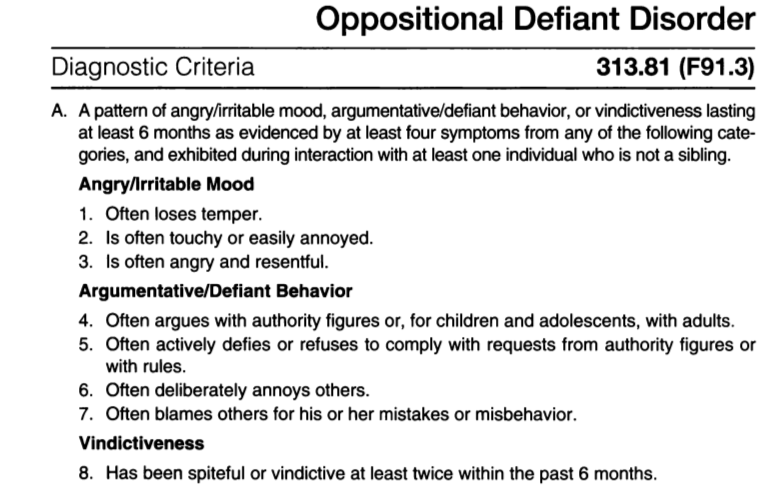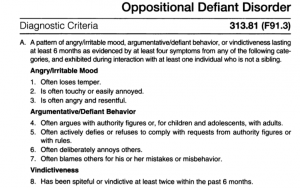The fifth edition of the Diagnostic and Statistical Manual of Mental Health, a.k.a DSM5, published in 2013 by the American Psychiatric Association, has a chapter of its section 2 dedicated to the diagnosis of “Disruptive, Impulse-control, and Conduct Disorders”. These refer to “conditions involving problems in the self-control of emotions and behaviors”. They are are “unique in that these violate the rights of others and/or bring the individual into significant conflict with societal norms or authority figures”.
Within the disruptive disorders group is the rather irritating ODD, namely Oppositional Defiant Disorder : “A pattern of angry/irritable mood, argumentative/defiant behavior, or vindictiveness lasting at least 6 months as evidenced by at least four symptoms from any of the following category, and exhibited during interaction with at least one individual that is not a sibling”.
The DSM warns that individuals with ODD will “typically not regard themselves as angry, oppositional or defiant. Instead, they often justify their behavior as a response to unreasonable demands or circumstances.” Also “it appears to be somewhat more prevalent in males than females, prior to adolescence”.
These types could seem like sound, possibly even brilliant, people we like to meet. Some in the profession have spoken against potentially debilitating categorizations.
For psychiatrist Bruce Levine, for instance, ODD is part of an arsenal of diagnoses which pathologize, to better neutralize, anti-authoritarian individuals.
See his “Why anti-authoritarians are diagnosed as mentally ill”, on Mad in America :
“In my career as a psychologist, I have talked with hundreds of people previously diagnosed by other professionals with oppositional defiant disorder, attention deficit hyperactive disorder, anxiety disorder and other psychiatric illnesses, and I am struck by (1) how many of those diagnosed are essentially anti-authoritarians, and (2) how those professionals who have diagnosed them are not.
Anti-authoritarians question whether an authority is a legitimate one before taking that authority seriously. Evaluating the legitimacy of authorities includes assessing whether or not authorities actually know what they are talking about, are honest, and care about those people who are respecting their authority. And when anti-authoritarians assess an authority to be illegitimate, they challenge and resist that authority—sometimes aggressively and sometimes passive-aggressively, sometimes wisely and sometimes not.
Some activists lament how few anti-authoritarians there appear to be in the United States. One reason could be that many natural anti-authoritarians are now psychopathologized and medicated before they achieve political consciousness of society’s most oppressive authorities.”
(continue reading here)


